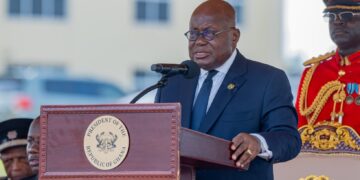To preserve Ghanaian culture and keep it from vanishing, Parliament should start using regional tongues during floor discussions.
According to Order 63 of the new Standing Orders, a Member of Parliament (MP) may communicate in any local language, provided that it is understood and interpreted appropriately.
The Eighth Parliament’s second meeting of its fourth session is when that is anticipated to get underway.
Alban Sumana Kingsford Bagbin, the Speaker of Parliament, announced that the required equipment, such as translators and gadgets for a smooth takeoff, would be put into place.
So the new measure will go into effect after Easter, barring any hiccups.
When Second Deputy Minority Leader Emmanuel Armah-Kofi Buah made a statement yesterday on the floor of Parliament advocating for the preservation and advancement of the Nzema language, the topic of the use of local languages came up.
The Nzema language is one of the 11 regional languages covered in the curriculum for the basic and senior high school grades, according to Mr Buah, also the MP for Ellembele in the Western Region for the National Democratic Congress.
Regretfully, there is cause for concern as interest in teaching and studying the language in our educational institutions is sharply declining, even though the language is at a very high level of development.
Members responded to this by calling for the use of local languages in basic schools to promote the languages and provide a proper understanding of the various subjects.
They said that science classes, including chemistry, ought to be able to be taught in the native tongues, much like the Asia Tigers.
The Speaker then ordered that the statement be referred for a decision to be made to the committees on education, culture, tourism, and finance.
The referral is intended to allow the Ghana Education Service to adopt the idea of utilizing the language in lower primary or basic education, promote Ghanaian tourism and culture, and take financial considerations into account.
On February 6, 2024, Parliament met again and started enforcing the new Standing Orders, which included a daily roll call of members and the recitation of the national pledge.
The previous Standing Orders, which were in force since 2006, have been replaced by the new ones.
The purpose of the roll call, which was recorded in order 14, is to increase the credibility of the attendance list and dispel any questions about who was in the chamber—especially during critical voting times.
The new Standing Order also aims to foster a sense of responsibility and discipline toward the voters who elected the MPs.
On the other hand, reciting the national pledge strengthens feelings of patriotism and love for the nation.
The Speaker declared that the signing of the attendance books in the chamber and by the committees remained unaffected by the oral roll call.














